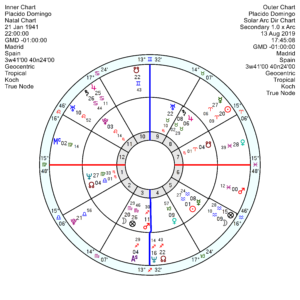





With Epstein gone, the focus has shifted onto Ghislaine Maxwell, his confidante and alleged facilitator. Stories are that she has deliberately disappeared or alternatively is splicing a deal with the feds in return for spilling the beans. (Though the Daily Mail has just announced she’s in a boyfriend’s multi-million dollar oceanfront house outside Boston. He now denies it and the Daily Beast says she could be in France where some of her siblings have houses.) She certainly looks cheerful enough for another ten days with tr Pluto conjunct her confident Sun/Jupiter midpoint; but there’s a calamity awaiting her from late September with tr Uranus opposition her Mars/Pluto midpoint for a few weeks and returning in early 2020.
There’s much talk of her having been under the thumb of her dominating and crooked father Robert Maxwell which made her more susceptible to falling under Epstein’s spell. She was seventh of nine children, her father’s favourite and evidently fell completely to pieces when he suicided/was murdered off the back of his yacht The Lady Ghislaine leaving behind billions in debts and murky tales of having been a Mossad and Russian agent.
I don’t quite buy the theory of Epstein being a father substitute. Maxwell senior was a Gemini with a brutal and ruthless Mars Pluto in Cancer square Saturn. Epstein was nowhere near as heavyweight a personality. There is a slight similarity in that Maxwell senior’s Airy Gemini Sun was trine Saturn and sextile Neptune; and Epstein’s Airy Aquarius Sun was square a Saturn Neptune conjunction – so both reasonably slippery.
What does connect the two men and Ghislaine is that both their money-attracting Jupiters, in Scorpio for senior and Taurus for Epstein, were tied into her focal point Neptune. Her Neptune squared her Jupiter and probably her flashy, five-star-lifestyle Leo Moon. She lived in a dreamworld with her father where money was no object and anything she wanted landed at her feet. When he died in debt, she needed a replacement money pot and Epstein filled the bill as well as having certain of the devious traits her father had.
Her relationship chart with her father is fascinating with a composite Sun opposition Neptune square Jupiter possibly opposition Moon – living in an illusory/delusional dream world of grandiosity. Emotionally a mess with a chilly and unpredictable Venus square Uranus and square Saturn but the Jupiterian bounty flowed regardless.
Her relationship chart with Epstein is nothing like that, with a passionately enthusiastic Venus Mars opposition Uranus which does admittedly square onto Neptune for a dash of deceit. But the composite Jupiter, so prominent with her father, is barely integrated. He definitely stirred her Venus which on the synastry was trine his Pluto.
This saga is likely to run and run.
See previous post on Ghislaine Maxwell, July 8 2019 with more details on her transits ahead.
Add on: What is a noticeable theme running through several associated charts is a Venus Mars conjunction, exact in Pisces in Epstein’s chart; in Capricorn in Prince Andrew’s; in Libra in Bill Clinton’s; and conjunct in Capricorn/Sagittarius in Ghislaine’s. It repeats, obviously, in all the relationship charts – as it does in Ghislaine’s relationship chart with her mother Elisabeth.
Mars conjunct Venus, whether in a relationship chart or an individual hints at a powerfully enthusiastic energy, usually quite sexualised. Sakoian & Acker remark that Venus Mars is one of the primary aspects concerned with sex, though it also indicates a passionate enthusiasm for any activity which interests. Feelings run very high when it occurs in a relationship chart and needn’t indicate a homosexual relationship if both are same gender. Where it is expressed sexually there will be a strong physical component to the connection. Ebertin associates it with a ‘strongly sensual nature, lack of tenderness and tact, a strongly emotional and sexual life coupled with disharmonious tendencies; masturbation.’
Elisabeth Maxwell, 11 March 1921, married Robert Maxwell when she was 24 and had nine children. She was a downbeat Sun Pisces opposition Saturn in Virgo; though with an adventurous Jupiter opposition Uranus. Her relationship with Robert wasn’t all negative with a wide affectionate Sun Venus and an upbeat Jupiter Mercury; though there was a trapped Pluto square Jupiter Saturn.
In many ways her relationship with Ghislaine was much more controlling than daughter with father, with Elisabeth’s Pluto opposition Gh’s Mercury Sun; with E’s Venus in Taurus trine GH’s Sun Mercury Mars and trine Uranus Pluto – so there would be a good deal of emotional intensity between them.
The relationship chart has a possessive and controlling composite Sun Mercury opposition Pluto; and a Venus Mars conjunction square Jupiter Saturn – which is half manically up and half hard-edged and unkind. Which may reflect the situation with the bullying father ruling the roost and presumably mother fitted in and facilitated him.
But based on this, mother makes more sense – at least on the astrology – of the Epstein connection. Though I’m struggling to disentangle the psychology of it. Weird family, weird cross currents.
Late Extra: For additional background on the weirdness of Mama Maxwell, snippets from a review by Jenny Diski of her autobiography A Mind of My Own. It explains a good deal and gives a hint that Ghislaine with Epstein to some extent mirrored her mother’s behaviour in the parental marriage.
‘For all the berating on his part and the grovelling on hers, Betty Maxwell comes across, not as a domestic doormat, but as a fully collusive partner in a very complicated relationship, which, right from the start, is powerfully sexual. But the power is not, as it appears or as it is portrayed, entirely one-sided.’
‘The key to this kind of partnership is not actually the dominant member’s demands, but the submissive one’s power to elicit those demands while seeming to remain docile. ‘I never felt belittled by deferring to his authority … He was forever searching for that indefinable “something” which he sensed I was holding back. For my own part, I was convinced it was precisely that very chasse au bonheur – the chase for love so clearly depicted in Stendhal – that would keep him interested in me.’
‘In addition to the nature of the hankerings, the prose style holds an important clue to Betty Maxwell’s character. There is a marvellous mixing of respectability and libido. She is the perfect suburban lady honeycombed with dark subterranean desires.’
‘Betty could play the dominance/submission game from either end of the pitch.’
‘The relationship between the two of them was all-consuming and it seems odd that they chose to have so many children (there were nine in all, of whom seven survived) to clutter their self-absorption. Perhaps hostages are necessary in such a relationship, so that notable sacrifices can be made as test and proof of sincerity of intent. When a choice was to be made between her husband’s overweening needs and her children, there was never any contest.’
https://www.lrb.co.uk/v17/n02/jenny-diski/bob-and-betty





























